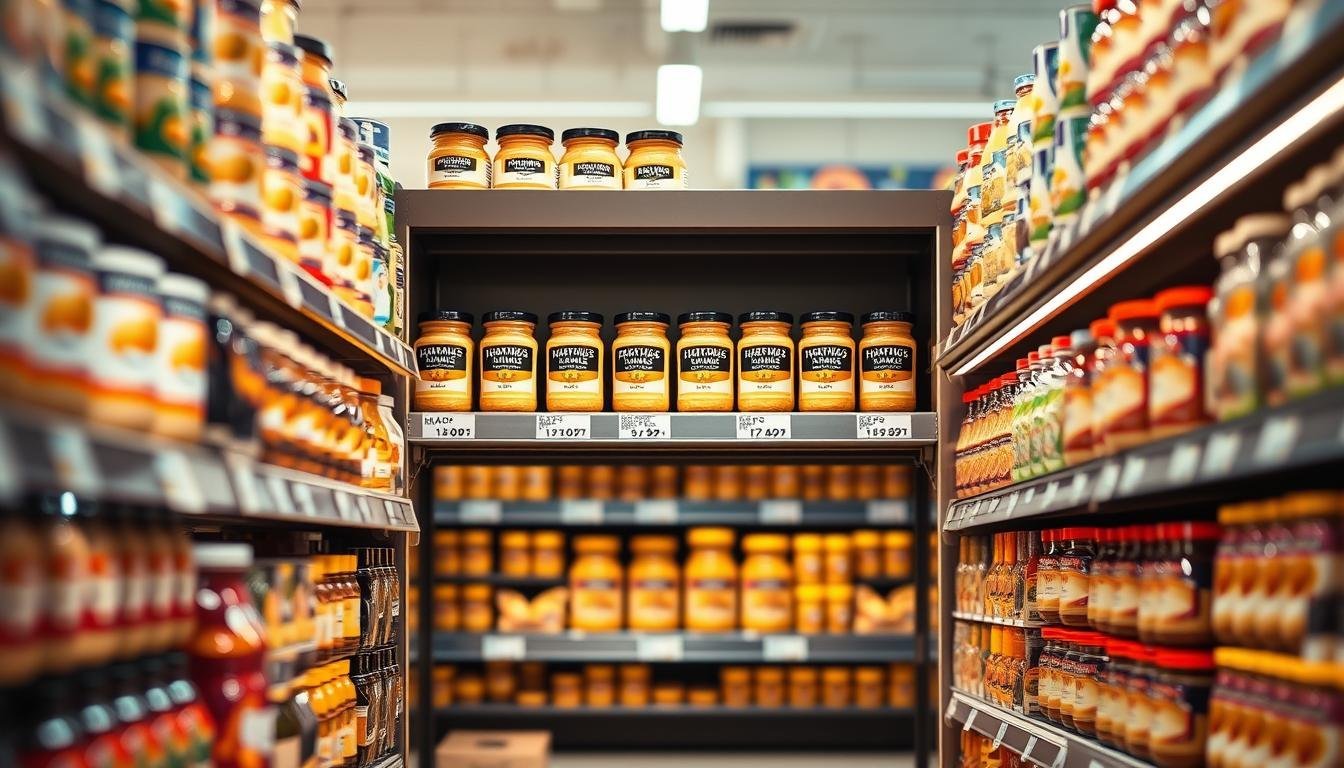Last updated on December 11th, 2025 at 02:03 pm
Can You Eat Hummus After Expiration Date? Hummus is a favorite dip and spread. But its shelf life is a big question. Is it okay to eat hummus after its expiration date?
Keeping food safe is key to a healthy diet. Eating bad or expired food can make you sick. The expiration date on hummus tells us when it’s best to eat it.

Many things can change how long hummus lasts. These include how you store it, the packaging, and how you handle it. Knowing these can help you decide if it’s safe to eat hummus and keep it fresh. [Can You Eat Hummus After Expiration Date?]
Contents
- 1 Understanding Hummus and Its Shelf Life
- 2 Decoding Food Labels: Expiration vs. “Best By” Dates
- 3 Can You Eat Hummus After Expiration Date?
- 4 How to Tell If Hummus Has Gone Bad
- 5 Proper Storage Methods to Extend Hummus Shelf Life
- 6 Health Risks of Consuming Spoiled Hummus
- 7 Conclusion: Can You Eat Hummus After Expiration Date?
- 8 FAQ
- 8.1 What is the difference between “expiration date” and “best by date” on hummus packaging?
- 8.2 Can you eat hummus after its expiration date if it has been stored properly?
- 8.3 How can you tell if hummus has gone bad?
- 8.4 Can you freeze hummus to extend its shelf life?
- 8.5 What are the health risks of consuming spoiled hummus?
- 8.6 How should you store hummus to maximize its shelf life?
- 8.7 Can you eat hummus after opening if it’s been refrigerated?
Understanding Hummus and Its Shelf Life
Ever wondered how long your favorite hummus stays good? It all comes down to what’s in it and how you store it. Hummus is a tasty dip or spread made from chickpeas, tahini, garlic, and lemon juice. Its shelf life depends on its ingredients, how you store it, and the packaging.
Homemade hummus and store-bought hummus are different. Homemade hummus, without preservatives, lasts a few days. Store it in the fridge at 40°F (4°C) or below. Store-bought hummus, with preservatives, lasts longer. But, always store it right to keep it fresh.
To keep your hummus fresh, whether you made it or bought it, store it right. Keep it in the fridge and seal the container well. For store-bought, follow the storage tips on the label. Even if it’s not expired, check for spoilage signs like bad smell or slimy feel.
Knowing what affects hummus shelf life lets you enjoy it at its best. Pay attention to storage and check the expiration date. This way, you can enjoy your hummus while it’s still fresh and safe.
Decoding Food Labels: Expiration vs. “Best By” Dates
To make informed decisions about the food you eat, it’s essential to understand the different types of dates found on food packaging. [Can You Eat Hummus After Expiration Date?]
The terms “expiration date,” “best by date,” and “use by date” are often confused with one another, but they have distinct meanings. The “expiration date” is typically the last date on which the product is considered safe to consume. On the other hand, the “best by date” is a manufacturer’s estimate of when the product will be at its peak quality.
- Expiration Date: The last date on which the product is considered safe for consumption.
- Best By Date: An estimate of when the product will be at its best quality.
- Use By Date: Similar to “best by date,” it’s the last date recommended for the use of the product at its peak quality.
Understanding these labels can help you make better choices about the hummus you buy and consume. When checking the label, look for these dates and consider what they mean for the product’s safety and quality.
By being aware of the differences between these dates, you can enjoy your hummus while it’s fresh and safe to eat.
Can You Eat Hummus After Expiration Date?
Wondering if it’s safe to eat hummus after the expiration date? It depends on a few things. These include if the container is open and how it’s stored. [Can You Eat Hummus After Expiration Date?]
Unopened Containers
Unopened hummus is generally safer than opened. But, the expiration date doesn’t mean it’s always safe. Look for signs of spoilage like an off smell or mold.
If it looks and smells okay, it’s likely safe. Always trust your instincts about food safety. [Can You Eat Hummus After Expiration Date?]
For unopened hummus, the “best by” or “use by” date is about quality, not safety. If stored in the fridge at 40°F (4°C) or below, it can last longer than the date suggests.
Opened Containers
After opening, hummus spoils faster. It’s best to eat it within a few days to a week. Always use a clean utensil and keep it refrigerated. [Can You Eat Hummus After Expiration Date?]
If the hummus’s texture, smell, or taste changes after opening, throw it away. Spoiled hummus can cause foodborne illnesses. It’s important to check for spoilage, especially after the expiration date, to avoid eating spoiled hummus.
In short, whether you can eat hummus after its expiration date depends on storage and if it’s open. Always check for signs of spoilage before eating, and consider storage conditions for safe hummus consumption.
How to Tell If Hummus Has Gone Bad
Want to know if your hummus has gone bad? Just check a few key signs. It’s important to inspect it regularly, especially after opening.
First, look for mold or yeast. If you see any unusual growth or colors, throw it out right away.
Next, examine the texture and smell. Good hummus is smooth and has a mild, nutty smell from the tahini and chickpeas. If it’s slimy or smells sour, it’s bad.
- Visible mold or yeast growth
- Slimy or separated texture
- Off or sour smell
- Sour or unpleasant taste
Also, think about how you store and handle it. Bad storage or contamination can be dangerous. [Can You Eat Hummus After Expiration Date?]
| Signs of Spoilage | Description | Action |
|---|---|---|
| Visible Mold | Fuzzy or colored spots | Discard |
| Slimy Texture | Unusual smoothness or separation | Discard |
| Off Smell | Sour or unpleasantly strong aroma | Discard |
By checking your hummus often and storing it right, you can enjoy it safely and fresh.
Proper Storage Methods to Extend Hummus Shelf Life
Storing hummus right is key to keeping it fresh longer. This applies whether you made it or bought it. The fridge is the best place to store hummus.
It’s important to use an airtight container for fridge storage. This keeps air out and prevents spoilage. You can also add plastic wrap or foil on top for extra protection.
Freezing Methods
Freezing is a good choice for longer storage. Move the hummus to a sealed container or bag. Make sure to remove air before sealing and label it.
Freezing might change the hummus’s texture. It might get grainy or separated. But, stirring well can usually fix it.
Thawing and Quality Considerations
To thaw, put the hummus in the fridge overnight or thaw it in cold water. Stir well after thawing. [Can You Eat Hummus After Expiration Date?]
Here’s a comparison of different storage methods for hummus:
| Storage Method | Shelf Life | Quality After Storage |
|---|---|---|
| Refrigeration | Up to 1 week | Remains fresh and creamy |
| Freezing | Up to 3 months | May become slightly grainy or separated |
By following these tips, you can enjoy hummus for longer. Whether you refrigerate or freeze, proper storage is key. [Can You Eat Hummus After Expiration Date?]
Health Risks of Consuming Spoiled Hummus
Spoiled hummus is not just bad tasting; it’s dangerous. Eating contaminated or spoiled hummus can cause food poisoning and stomach problems. It’s very important to keep food safe, especially with items like hummus that spoil quickly.
When hummus goes bad, it can harbor harmful bacteria like Salmonella and E. coli. These bacteria can lead to serious illnesses. Symptoms include diarrhea, vomiting, and stomach pain.

| Health Risk | Symptoms | Prevention |
|---|---|---|
| Food Poisoning | Diarrhea, Vomiting, Abdominal Cramps | Check Expiration Dates, Store Properly |
| Gastrointestinal Issues | Bloating, Gas, Stomach Pain | Avoid Cross-Contamination, Consume Fresh |
To stay safe, handle and store hummus right. Always check the expiration date and watch for signs of spoilage. Your health is more important than a little extra care. [Can You Eat Hummus After Expiration Date?]
Conclusion: Can You Eat Hummus After Expiration Date?
You now know why it’s important to check hummus before eating it, even if it’s past its expiration date. Keeping it stored right and knowing when it’s gone bad is key to keeping food safe. Hummus can last longer if stored well, but always check its condition first.
To keep your hummus safe and tasty, always look for signs of spoilage before you eat it. Being careful with how you store and consume hummus helps you enjoy it safely. This way, you can enjoy this healthy dip without worrying about getting sick.
FAQ
What is the difference between “expiration date” and “best by date” on hummus packaging?
The “expiration date” is when the product is no longer safe to eat. The “best by date” is when the product is at its best quality. [Can You Eat Hummus After Expiration Date?]
Can you eat hummus after its expiration date if it has been stored properly?
Yes, you can eat unopened hummus after its expiration date if it’s been stored right. Just make sure to check it first.
How can you tell if hummus has gone bad?
Look for mold, bad smells, a slimy feel, or a sour taste. If you see any of these, throw the hummus away.
Can you freeze hummus to extend its shelf life?
Yes, freezing hummus can make it last longer. But, it might change its texture and taste. So, follow the right freezing and thawing steps.
What are the health risks of consuming spoiled hummus?
Eating bad hummus can cause food poisoning and stomach problems. So, always check the hummus before eating it.
How should you store hummus to maximize its shelf life?
Keep hummus in the fridge at a cold temperature. For even longer storage, freeze it. [Can You Eat Hummus After Expiration Date?]
Can you eat hummus after opening if it’s been refrigerated?
Yes, you can eat hummus a few days after opening if it’s been kept cold. Just make sure to check it first.

Hello, I am Bellamy George, a certified nutritionist and food safety specialist from Springfield, IL. With a degree in Food Science, I share research-backed insights on edible foods, seeds, and seafood for safe, informed eating.

